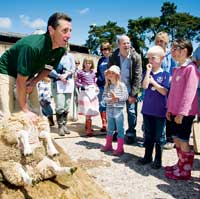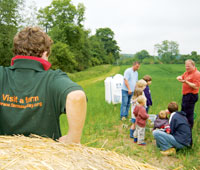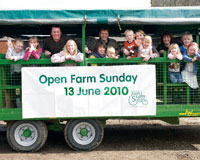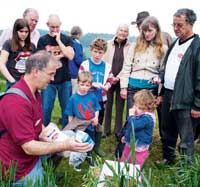10 steps to Open Farm Sunday success

Open Farm Sunday is the industry’s great promotional event – its annual open day and a chance to show the general public the story behind their food and how the countryside is cared for.
Each event is individual and unique and can range from a small farm walk for a group of 20 locals to a jamboree of activities and rural treats attracting thousands.
Organised by Linking Environment and Farming (LEAF), farmers hosting events are encouraged to register to qualify for free resources, information and advice to help ensure the event is safe, enjoyable and fun.
LEAF recommends you start planning your event well in advance, especially if a large number of visitors are expected. Ensure you have plenty of helpers, too – many events involve the whole community, and a number of farmers often get together, with one hosting the event and others providing machinery and animals and building activities round these.
To help you through the process, LEAF and Farmers Weekly have put together 10 essential steps:
1 Get the right number of people. If you want a small event, consider inviting one or two local groups. Or involve your local school and hand out invitations. Postcards, provided in the resource pack, are an invaluable tool. You can display the posters in local shops or on notice boards. For larger events, use the roadside banner next to a main road.
 2 Harness the media. This may be the parish magazine, local newspaper or even radio station. Be aware of lead times – some magazines are written months in advance – and offer good quality photos. Think about what angle would attract interest, although editors do like good farm-based stories. Use the generic press release, downloadable from www.farmsunday.org, to spark initial interest.
2 Harness the media. This may be the parish magazine, local newspaper or even radio station. Be aware of lead times – some magazines are written months in advance – and offer good quality photos. Think about what angle would attract interest, although editors do like good farm-based stories. Use the generic press release, downloadable from www.farmsunday.org, to spark initial interest.
3 Make the link between the farm and the fridge. Once you’ve got your visitors to the farm, help them understand what you do by starting at the fridge end to make the story relevant to them, rather than start off by talking about farming.
 4 Make it memorable and fun. Think of activities that your visitors can smell, feel or hear as well as see. They can plunge their hands in buckets of grain or smell fresh-cut silage. Every day farming activities can be fascinating – you could fence off a demonstration area to show bale-wrapping or allow people to come through the parlour at milking. Design a quiz around a nature trail and offer prizes, such as seeds, available in the resource pack.
4 Make it memorable and fun. Think of activities that your visitors can smell, feel or hear as well as see. They can plunge their hands in buckets of grain or smell fresh-cut silage. Every day farming activities can be fascinating – you could fence off a demonstration area to show bale-wrapping or allow people to come through the parlour at milking. Design a quiz around a nature trail and offer prizes, such as seeds, available in the resource pack.
5 Fill them with fascinating facts. Do you know UK households throw away 8.3m tonnes of food every year? Without fertiliser the world could only feed half its people. There’s plenty of great literature and resources you can get to help you tell the story of food from levy boards, the NFU, and organisations such as the Love Food Hate Waste and Home Composting campaigns. More information can be found in the 2010 Farmer Host Handbook, available as part of the free resource pack.
6 Make it safe. Health and Safety is important, but shouldn’t overshadow the day. Get a friend – a fresh pair of eyes – to do a risk assessment. There’s one that’s simple to follow in the Farmer Host Handbook. Also make sure you inform your insurer and follow guidelines in the handbook on tractors and trailers and avoiding ill health.
 7 Clean hands. If you allow visitors in with animals, you must provide hand-washing facilities with soap, running water and paper towels. Segregate animal enclosures from eating areas, and make sure they’re well supervised.
7 Clean hands. If you allow visitors in with animals, you must provide hand-washing facilities with soap, running water and paper towels. Segregate animal enclosures from eating areas, and make sure they’re well supervised.
8 Tidy yard. No one expects the farm to be spotless, but it should be safe. Cordon off muck heaps, slurry pits and collecting yards, clean muck off railings and partitions your visitors are likely to touch and keep walkways clear. Put fresh bedding in animal enclosures and watch for faecal seepage.
9 Be positive, prepared and jargon-free. Make sure you’ve an answer to those tricky questions, but do get across the positive sides of your farm, such as any wildlife or habitat management work you’ve undertaken. And keep terms like livestock, tonnes, CAP and yield out of your replies.
10 Keep it personal. You don’t have to answer questions on behalf of the industry. This is your day, on your farm to show people how you produce their food. Make the most of the opportunity and enjoy it – it’s thoroughly rewarding.
Sponsors
Open Farm Sunday is paid for entirely through generous cross-industry support. The 2010 sponsors are:
Asda, DEFRA, Farmers Weekly, Frontier Agriculture, LEAF Marque, Morrisons, National Grid, Natural England, Waitrose, Warburtons, Love Food Hate Waste and Home Composting, DairyCo, Dairy Crest, EBLEX, HGCA, Marks & Spencer, NFU, GrowHow, Produce World, Soil Association, Duchy College, Farm Stay UK, Wiggly Wigglers.
What will you achieve on Sunday, 13 June?
A real sense of achievement is one of the main things around 5500 host farmers and helpers get out of Open Farm Sunday. Feedback suggests there are three main benefits for the 425 farms that took part in 2009:
Business boost Many farmers looking to diversify have found Open Farm Sunday is the ideal test bed to try out ideas on the local market, or promote a young enterprise they’ve started, such as a farm shop, local food or events business
Build a community Farms have a natural place at the centre of a village or rural community. Host farmers have found Open Farm Sunday builds a greater understanding of their farming practices. This means the local community is more likely to understand and co-operate on issues such as planning, muck-spreading and harvesting late
Industry understanding Perhaps the biggest buzz host farmers and helpers get out of the day is the knowledge that they’re improving the public’s understanding of food and farming. 140,000 visited farms in 2009, with 98% rating their day good, amazing or brilliant. Surveys show their understanding of a farmer’s role improves substantially as a result. Meanwhile last year the national publicity campaign for Open Farm Sunday touched some 66m through widespread media coverage.
What to do now
Go to www.farmsunday.org for more information. There you’ll find the new online workshop with tips and advice from experienced Open Farm Sunday hosts. It’s also the place to register and get your free resources. Or call LEAF on 024 7641 3911.
Join the community at www.fwi.co.uk/openfarmsunday. Pick up tips from experienced Open Farm Sunday hosts or give your own. Watch the videos, post your photos and be a part of farming’s great event.
CASE STUDY
Andrew Coombs Bath, Somerset
If Andrew Coombs helps just one person get a greater understanding of food or farming, the day’s been worth it. But he reckons the benefits of Open Farm Sunday reach even further.
“If you take the time to explain why and how things are done, people get a much greater understanding. If they understand more about their food and the countryside around them they feel more included. Suddenly they’re working with you, rather than giving you a hard time.”
A sheep farmer with 200 pedigree Charolais and 50 Zwartbles, Mr Coombs helps out at neighbouring farmers Jeremy and Sue Padfield, who put on one of the largest events in the South West at Radstock, near Bath. He brings a small flock of his sheep and shears about half a dozen on the day.
“I toss a fleece on the ground and ask people to guess the price. They say anything up to £70. The penny begins to drop when I tell them it’s only worth 30p.”
He joins a bevy of helpers at the event. Arable neighbours provide tractors and trailers for guided tours. There are local food stalls and another neighbour with pigs. “You give up a few hours on a Sunday, but you really feel you’re making a difference.”
CASE STUDY
Andy Hoyles King’s Lynn, Norfolk
When Sarah and Julian Kerkham looked for support to put on an event at their farming businesses near King’s Lynn in Norfolk, Andy Hoyles, a grain trader with Frontier Agriculture, was only too keen to put his name forward.
“A lot of people never get to visit a farm and take a real interest in what you show them on the day. This gave me the chance to step beyond my normal farm trader role. It was great to be a part of it and to explain the many facets of managing the countryside, not just food production.”
He based his story around the theme “where does your breakfast come from?”. Products from the supermarket shelf were matched to pots of growing crops and samples of rapeseed, wheat and barley. “I encouraged visitors to feel and touch as well as look and understand.”
For Mr Hoyles it was also a chance to express the depth and breadth of the industry he works in. He was keen to show how Frontier, a principal sponsor of Open Farm Sunday since 2008, contributes to the story. “Open Farm Sunday helps not just farmers. It benefits the whole industry. It’s our chance to show all the good work that goes in to bringing food to the table.”
And his top tip for 2010? “Be ready for anything. Make sure you have your answers prepared because your visitors will ask you anything – you’d be surprised in the interest they take in things we do every day.”
